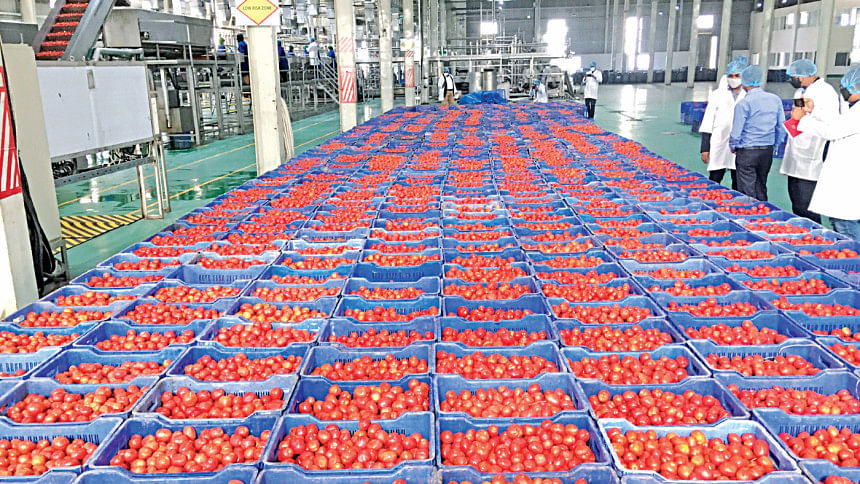Huge potential to raise agro, processed food exports to UK

Agricultural and processed food exports from Bangladesh to the United Kingdom (UK) would increase if the shipments were certifiably pure, according to exporters.
Exporters currently face obstacles in form of the parameters by which such products are tested in European countries.
This means that shipments which pass purity certification standards in Bangladesh are at times sent back for having failed to meet any given requirement, such the content of pesticides used.
These comments came at a stakeholder consultation, styled "Expanding and Diversifying Bangladesh's Export to the UK Market".
The event was jointly organised by Research and Policy Integration for Development (RAPID) and the UK's Foreign, Commonwealth and Development Office at the University of Dhaka yesterday.
Rezaul Karim, assistant manager of the international marketing department of Square Food and Beverage Limited, said the certification process for exports to European nations varies from country to country.
"So, stakeholders should come forward to overcome these challenges," he added.
Karim went on to say that as the restaurant business in the UK is quite large, the country has high demand for spices.
"And if Bangladesh is able to fully capture this market, then export earnings would increase a lot," he said.
Karim then informed that his company is working on exporting ready-to-eat food to the UK market.
Monirul Islam, deputy general manager of Alin Food Products Limited, said Bangladesh is on the backfoot when it comes to following the standards set by European countries.
Spices are among the more valuable products being exported so if it could be shipped in bulk, then earnings from the segment would hit double digits, he added.
Eleash Mridha, managing director of PRAN Group, said the country would have to increase its exports to the UK's mainstream market in order to raise shipment volumes.
The UK's Developing Countries Trading Scheme (DCTS) could be a gamechanger for Bangladesh to break into non-garment export sectors, including that of agro-processed goods, said Mohammad Abdur Razzaque, chairman of RAPID.
Earlier this year, the UK introduced the DCTS, a preferential trading scheme for developing countries, marking its departure from the EU's Generalized System of Preferences.
Bangladesh now enjoys duty-free market access as a least developed country (LDC) through the DCTS Comprehensive Preferences scheme. And after the country's LDC graduation in 2026, it will continue to enjoy the same benefit until 2029, he added.
M Abu Eusuf, a professor and former chairman of the department of development studies at the University of Dhaka, said Bangladesh's exports are heavily reliant on garments and so, it is essential to expand the participation of other viable items through product diversification.
Bangladesh has huge potential to increase exports to the UK as it is a prospective market where the country could expand shipments of agro-processed products, said Eusuf, who is also an executive director of RAPID.
There are around 1,000 agro-food processors in Bangladesh, employing around 250,000 workers, according to the Bangladesh Investment Development Authority (BIDA).
Bangladesh exports a wide range of agricultural and processed food products such as cereal grains, vegetables, fruits, spices and meat to more than 100 countries worldwide.
In fiscal 2019-20, the agricultural and processed food sector exported over 700 items, including approximately 60 processed food products, BIDA said.
Currently, some 250 agro or food processing companies export their products from the country.

 For all latest news, follow The Daily Star's Google News channel.
For all latest news, follow The Daily Star's Google News channel. 



Comments